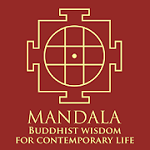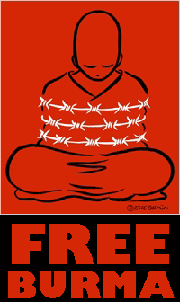
|
|
|
Home Asia Pacific South East Asia Myanmar Myanmar Protest News Burma: The Glass Palace Prisonby Sagari Chhabra, Hindustan Times, 3 November 2007Yangon, Myanmar -- I had the privilege of living a few houses away from Aung San Suu Kyi onYangon’s University Avenue by Inya Lake, for several months. The sole reason for choosing my residence was I was hoping to meet or at least get a glimpse of the most famous political prisoner and proponent of non-violence, alive.
The office then headed by Rajiv Kapur, had a poster: “A refugee would love to have your problems.” Suu Kyi looked at the poster poignantly and shook her head—“no one would like to have my problems,” she told him. Indeed after her party, the National League of Democracy, won almost eighty per cent of the votes in the last elections, the military regime responded by imprisoning her and almost all her supporters. Everywhere I travelled, I had to have a liason officer accompanying my research trips. At Ziawaddy the door banged at eight pm. “Who is it?”—I asked alarmed. The voice informed me that I had to report to the police station along with my Burmese liason officer to record our visit. “If you neglect to do this, you will be imprisoned.”
DURING my travels through the breathtakingly beautiful country, green with tropical forests and gold with pagodas in every village, I met the most deeply spiritual and gentle people in the world. The Burmese feed and clothe monks who have the highest position in the Buddhist hierarchy, which they believe earns them merit. These monks led the recent demonstrations, but the military brutalised them, raiding monasteries across the country, savaging and arresting thousands of monks and lay people. While the Indian Government is practicising a ‘Look East’ policy, let me share with you the shame and horror I felt, on seeing so many people of Indian origin living without citizenship of Burma. Being without citizenship implies that they cannot hold a proper job, buy or sell property or even travel within Burma without permission. Some of them were members of Netaji’s Indian National Army or those who fought for the freedom of India. Official figures indicate that there are over 400,000 people of Indian origin, without citizenship. Surely India should look after the interests of its own people by obtaining their basic rights? I also tried to bring the matter to the attention of Kedar Nath who I was told was the head of the Arya Samaj in Burma. We talked on the telephone and agreed to meet in a week’s time, but within that period he was dead. He was only sixtytwo and had been imprisoned in a Burmese jail for four years on the charge of ‘having given a letter to a monk to take to India’, my sources said. The conditions in jail were so pathetic that his health deteriorated and while he was released, he died soon after. This is the plight of many socially and politically active people within Burma. The pictures that are emerging are only the tip of the ice-berg. While India maintains a ‘Look East’ policy, the North-East States are victim to the golden triangle—drug-running that originates from Burma into India. In desperation, India is even resorting to a ‘harm minimisation’ programme; which is distributing free needles so that the young are protected from HIV. The fact is, profits of drugs are what the Burmese militia use to build safe havens in the West, where they will eventually retreat once democracy returns to Burma, before long. Burma has been isolated for too long and while India soft-peddles its approach, claiming that the Generals help us in ‘Operation Golden Bird’ to control insurgency in the North-East, the truth is, the Generals enjoy giving the insurgents a safe haven in Burma while unleashing a ‘joint-operation’ as an eye-wash. Absolute and brute power has been wielded to keep some of the most spiritual, gentle and compassionate people in the world oppressed; but the question is: for how long? International opinion will have to build up to release Aung San Suu Kyi and the Burmese people from the prison-house that the militia has created out of Burma. ----------------------- |
 Get your Korean Buddhist News here, brought to you by BTN-Buddhist Channel |
 |
 The Mandala app brings together Buddhist wisdom and meditation techniques with the latest insights of psychology and neuroscience to handle the challenges and complexities of modern life. The App offers a series of engaging talks and conversations with experts on a wide variety of topics, such as managing stress, dealing with adversity, developing greater resilience, cultivating empathy and compassion, creating healthy relationships, and many more. These topics are explored to help find greater peace, meaning and joy in our lives. Our panel of experts include Dr, Thupten Jinpa, Daniel Goleman, Kelly McGonigal and others.FREE DOWNLOAD here |
| Point
your feed reader to this location |
| Submit an Article |
| Write to the Editor |

 On her sixty second birthday Aung San Suu Kyi had spent a total of eleven years, ten months and twentyseven days under house arrest, with short spells in which she was allowed to meet the people. On one such occasion, she visited the office of the United Nations High Commission for Refugees in Yangon.
On her sixty second birthday Aung San Suu Kyi had spent a total of eleven years, ten months and twentyseven days under house arrest, with short spells in which she was allowed to meet the people. On one such occasion, she visited the office of the United Nations High Commission for Refugees in Yangon. 